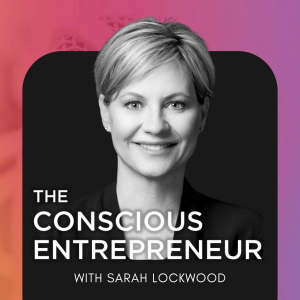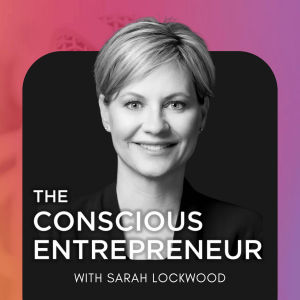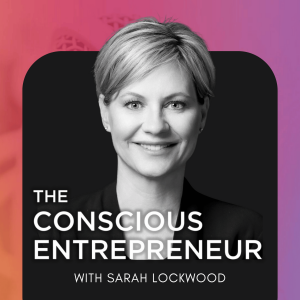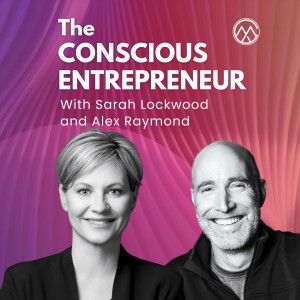The Conscious Entrepreneur | Leadership, Self-Awareness & Mindset
The Conscious Entrepreneur is a top-ranked business and entrepreneurship podcast where business founders come to sharpen their edge from the inside out - building businesses that are sustainable, aligned, and actually work for their life. It’s about becoming the kind of leader your business needs you to be, and doing it with clarity, connection, and purpose. We don’t buy into hustle culture. And burnout? It’s not a badge of honor. Here, we believe thriving businesses are built by thriving people.
Popular Episode Topics Include:
-
Entrepreneur Burnout - How to recognize burnout early, break overworking patterns, and build a business that doesn’t depend on your exhaustion.
-
Sustainable Entrepreneurship - Growing your company at a pace you can actually sustain—without sacrificing your health, values, or sanity.
-
Calm Leadership - Leading with steadiness instead of stress, staying grounded during pressure, and building emotional resilience as a founder.
-
Values-Based Leadership - Creating a culture rooted in integrity, trust, and ownership while leading in a way that aligns with who you are.
-
Delegation & Letting Go - Learning to stop doing everything yourself, trust your team, and step out of the bottleneck role so your business can grow.
-
Founder Mental Health - Real conversations about loneliness, stress, purpose, and the emotional side of entrepreneurship that most people hide.
-
Anti-Hustle Entrepreneurship - Healthy productivity, aligned ambition, and redefining success without grind culture or burnout.
-
Growth Mindset - Adapting, learning, and evolving as a leader so you can navigate setbacks, fear, and uncertainty with more clarity.
- Emotional Intelligence - Using self-awareness, empathy, and emotional regulation to communicate better, lead stronger, and build a healthier team.
Hosted by Sarah Lockwood, The Conscious Entrepreneur is where growth starts within.
Episodes

Monday Jun 30, 2025
Monday Jun 30, 2025
Jesse Pujji reveals how he builds wildly successful companies from scratch by doubling down on talent, distribution, and the power of bootstrapping.
In this episode, Sarah Lockwood sits down with the serial founder and investor behind Gateway X, a venture studio that launches and scales high-performing companies without venture capital. Jesse shares how he went from Goldman Sachs and McKinsey to building Ampush, one of Facebook’s earliest and most effective performance marketing agencies, which grew to manage over $1 billion in ad spend for top brands like Uber, Peloton, and Dollar Shave Club. That experience became the foundation for how he now builds high-performance teams and scalable businesses through bootstrapping.
Jesse breaks down the core principles that drive his companies: hiring exceptional talent, obsessing over sales and distribution, and staying rooted in profitability from day one. He shares the origin stories of ventures like GrowthAssistant, which connects startups with offshore marketing talent, and explains how each business at Gateway X is shaped by a unique unfair advantage and the right operating partner, not a VC-funded roadmap. From his two-farm model for sourcing ideas and people to his frameworks for knowing when to walk away from a failing project, Jesse offers a rare look into what it really takes to scale without VC.
This is a must-listen for founders ready to trade the unicorn myth for real traction, culture-driven leadership, and sustainable growth on their own terms.
Episode Breakdown:
00:00 Jesse Pujji’s Entrepreneurial Journey from Ampush to Gateway X
05:01 Core Principles for Bootstrapping and Scaling Without VC
08:48 How GrowthAssistant Scaled to $20M in Revenue
13:32 The Two-Farm Model: Matching Ideas with the Right People
15:00 Knowing When to Kill an Idea and Move On
16:02 Inside Aux: Translating Marketing for Private Equity
21:09 Why Sales and Distribution Matter More Than Product
22:14 The Power of High Performance Teams
27:02 Building Profitable Companies with Operational Rigor
34:30 Managing Attention, Energy, and Leadership Across Startups
38:48 Conscious Leadership and the Value of Coaching
Links
Dave Kashen - Startup CEO Coach
Book - The 15 Commitments of Conscious Leadership: https://a.co/d/j4uKz9A
Connect with The Conscious Entrepreneur:
LinkedIn: https://www.linkedin.com/company/conscious-entrepreneur/
Instagram: https://www.instagram.com/conscious_entrepreneur_summit/
Website: http://www.consciousentrepreneur.us
Connect with Jesse Pujji:
Website Gateway X: https://www.gateway.xyz/
LinkedIn: https://www.linkedin.com/in/jessepujji/
Connect with Sarah Lockwood:
LinkedIn: https://www.linkedin.com/in/lockwoodsarah/
Website: https://hivecast.fm
HiveCast.fm is a proud sponsor of The Conscious Entrepreneur Podcast.

Monday Jun 23, 2025
Monday Jun 23, 2025
Most entrepreneurs aren’t drowning in work because they lack ambition. They’re stuck doing too much of the wrong kind of work.
Sarah Lockwood talks with Julie Johnston, the founder of Rhino Squad, about what it looks like to operate from your zone of genius. They unpack the mindset traps that keep founders stuck in the weeds and walk through how small shifts in delegation can lead to major changes in time management and business growth.
Julie shares what she’s learned helping leaders hire and work with virtual assistants, especially from the Philippines, and how a global workforce can unlock more freedom, better output, and stronger team culture. Are your top people doing high-value work? What could your business look like if they were?
Julie encourages founders to think big and recognize where VAs can support every part of your organization from revenue driving activities to business operations - VAs can do much more than confirm appointments, reschedule meetings or manage your inbox (although that ‘s a great place to start if you haven’t yet)! If you’ve been hesitant to delegate or unsure where to start, Sarah and Julie’s conversation will help you rethink how you’re spending your time and what it’s really costing you.
Episode Breakdown:
00:00 Meet Julie Johnston and Rhino Squad
02:03 Mindset Shifts for Effective Delegation
06:53 Maximizing Time with Virtual Assistants
10:50 Building a Supportive Team Culture
14:01 10X Thinking and Global Workforce Strategy
24:17 Julie’s Conscious Entrepreneurial Journey
29:49 Core Values Behind Rhino Squad
Links
Connect with The Conscious Entrepreneur:
Website: http://www.consciousentrepreneur.us
LinkedIn: https://www.linkedin.com/company/conscious-entrepreneur/
Instagram: https://www.instagram.com/conscious_entrepreneur_summit/
Connect with Julie Johnston:
Website: www.rhinosquad.org
Instagram: https://www.instagram.com/rhinosquad_virtualassistants/
LinkedIn: https://www.linkedin.com/in/rhinojulie/
Connect with Sarah Lockwood:
LinkedIn: https://www.linkedin.com/in/lockwoodsarah/
Website: https://hivecast.fm
HiveCast.fm is a proud sponsor of The Conscious Entrepreneur Podcast.
Podcast production and show notes provided by HiveCast.fm

Monday Jun 16, 2025
Monday Jun 16, 2025
Most teams aren’t drowning in work. They’re drowning in distractions.
Sarah Lockwood is joined by Jenna Piché, the founder of First Light Time Management Coaching, for a timely conversation about team productivity, deep work, and sharpening your leadership focus. With the year halfway over, it’s a good moment to stop and ask: Are you making real progress on the goals you set in January or just staying busy?
Jenna shares why so many leaders unintentionally build cultures where busyness is rewarded, and why that’s such a dangerous trap. When everything feels urgent, it’s easy to lose sight of the work that actually moves the needle. What signals are you sending to your team about what matters? Are people clear on what to focus on or are they stuck reacting all day?
They also discuss the psychology of productivity and procrastination, including what’s actually going on in your brain when you put off the hard stuff. And they talk through what it looks like to shift into a culture that values deep work and gives people the space to do their best thinking.
If your team’s attention feels fractured (or maybe your own), Jenna offers a smart reset. The kind that helps you see where time is leaking out of your day, and how to fix it before the second half of the year slips by.
Episode Breakdown:
00:00 Reflecting on Goals and Productivity
02:53 Misaligned Priorities and the Myth of Busyness
06:14 Creating a Culture of Focus
09:00 Identifying Misalignment in Teams
14:55 Overcoming Procrastination and Fear
18:05 Shifting Mindsets for Deep Work
21:00 Building a Supportive Team Culture
23:56 Setting Seemingly Impossible Goals
Links
Connect with The Conscious Entrepreneur:
Website: http://www.consciousentrepreneur.us
LinkedIn: https://www.linkedin.com/company/conscious-entrepreneur/
Instagram: https://www.instagram.com/conscious_entrepreneur_summit/
Connect with Jenna Piche:
Fractured or Focused Attention Assessment: https://eencclvnukx.typeform.com/to/dMYQ67rp
LinkedIn: https://www.linkedin.com/in/jennapiche/
Instagram: https://www.instagram.com/firstlightcoach/
Website: https://firstlighthealth.co/womens-health-and-focus-coaching
Connect with Sarah Lockwood:
LinkedIn: https://www.linkedin.com/in/lockwoodsarah/
Instagram: https://www.instagram.com/hivecast.fm/
Website: https://hivecast.fm
HiveCast.fm is a proud sponsor of The Conscious Entrepreneur Podcast.
Podcast production and show notes provided by HiveCast.fm

Sunday Jun 15, 2025
Sunday Jun 15, 2025
The Conscious Entrepreneur is the podcast where founders come to sharpen their edge from the inside out - building businesses that are sustainable, aligned, and actually work for their life. It’s about becoming the kind of leader your business needs you to be, and doing it with clarity, connection, and purpose.
We don’t buy into hustle culture. And burnout? It’s not a badge of honor. Here, we believe thriving businesses are built by thriving people.
Hosted by Sarah Lockwood, The Conscious Entrepreneur is where growth starts within.

Monday Jun 09, 2025
Monday Jun 09, 2025
Most entrepreneurs say they want to think bigger, but only a few actually build the systems, community, and habits that make those impossible goals inevitable.
Fresh off the Conscious Entrepreneur Summit, Sarah Lockwood and Alex Raymond came home with more than just notes. They came home with decisions. In this episode, they talk through what shifted for them, what they’re already doing differently, and how the right kind of environment can shake you out of survival mode fast.
Alex shares how Dr. Ben Hardy’s session pushed him to commit publicly to growing AMplify into a $3M business in two years. Sarah walks through the behind-the-scenes changes she’s making at HiveCast right away, from automating scattered processes to freeing up time for the kind of work that actually moves things forward. They both reflect on the deeper mindset work sparked by the event, including what it means to lead with intention and how to shrink the timeline between vision and execution.
One of the biggest pieces of post-summit momentum is the launch of the 10X Implementation Circle, which is a year-long, founder-only group for serious entrepreneurs who want accountability, structure, and real community while working toward their boldest goals. Didn’t make it to the summit this year but want in on what’s next? Apply here 👉🏽www.consciousentrepreneur.us
Listen for:
00:00 Post-Summit Reflections and Key Takeaways
01:43 Dr. Ben Hardy on Impossible Goals and Time as a Tool
05:43 Alex Raymond’s $3M Business Commitment
07:06 Rethinking Priorities and Delegating for Impact
10:41 Nervous System Regulation with Marina and Beck
13:07 Entrepreneurial Mindset with Dr. Michael Freeman
17:33 Inside the 10X Implementation Circle
Connect with The Conscious Entrepreneur:
Website: http://www.consciousentrepreneur.us
LinkedIn: https://www.linkedin.com/company/conscious-entrepreneur/
Instagram: https://www.instagram.com/conscious_entrepreneur_summit/
Connect with Alex Raymond:
Website: https://amplifyam.com/
LinkedIn: https://www.linkedin.com/in/afraymond/
Connect with Sarah Lockwood:
Website: https://hivecast.fm
LinkedIn: https://www.linkedin.com/in/lockwoodsarah/
Instagram: https://www.instagram.com/hivecast.fm/
HiveCast.fm is a proud sponsor of The Conscious Entrepreneur Podcast.
Podcast production and show notes provided by HiveCast.fm

Monday Jun 02, 2025
Monday Jun 02, 2025
Most podcasts talk tactics, but The Conscious Entrepreneur turns the spotlight inward.
This episode marks a new beginning for The Conscious Entrepreneur as Alex Raymond passes the mic to Sarah Lockwood, the show’s new host. They reflect on the recent summit in Boulder and the kind of conversations that matter most to this community, the ones that don’t just skim the surface.
Sarah shares why she raised her hand to take on this role and what keeps her so invested in the work. As the CEO of HiveCast, she’s helped hundreds of founders launch and grow their podcasts. But here, she’s stepping into something more personal: creating space for honest conversations about the fears, habits, and thought patterns that shape the entrepreneurial journey.
What happens when we stop comparing our beginnings to someone else’s highlight reel? How do we keep showing up when the pressure to hustle never really lets up? Sarah and Alex unpack these questions and more, with a shared belief that the real growth happens behind the scenes, in community, through vulnerability, and with a little less pretending.
Alex isn’t disappearing; he’ll still be around. But with Sarah at the helm, the podcast enters a new season, one built around thoughtful interviews, lived experience, and ideas you’ll actually want to take back into your life and work.
Episode Breakdown:
00:00 Welcome and Summit Recap
01:04 Meet the New Host: Sarah Lockwood
02:30 Sarah’s Entrepreneurial Journey
05:12 The Story Behind HiveCast
08:37 Why Podcasting Matters
17:52 Rethinking Hustle Culture
20:31 Habits and Inspiration for Entrepreneurs
23:40 What’s Next for the Show
Links
Connect with Sarah Lockwood:
LinkedIn: https://www.linkedin.com/in/lockwoodsarah/
Website: https://hivecast.fm
Connect with Alex Raymond:
LinkedIn: https://www.linkedin.com/in/afraymond/
Website: https://amplifyam.com/
HiveCast.fm is a proud sponsor of The Conscious Entrepreneur Podcast.
Podcast production and show notes provided by HiveCast.fm

Monday May 26, 2025
Monday May 26, 2025
Guarding your joy while leading high-stakes work is not optional. It is the only way to last.
Dr. David Johns sits down with Alex Raymond for a conversation on what it means to lead without losing yourself. What keeps you grounded when the work feels endless? How do you stay in the fight without letting it consume you?
Drawing from his journey, from growing up in Inglewood to serving in the Obama White House and now leading the National Black Justice Coalition, Dr. Johns shares how his leadership is shaped by purpose, community, and a deep sense of responsibility. He talks about centering the voices that are too often excluded, especially in education, and calls out the difference between performative gestures and true accountability. He reflects on the emotional cost of this work, the need for spaces that restore rather than drain, and why joy is something worth protecting at all costs. The episode also touches on his podcast, Teach the Babies, and his belief that love and dignity must be foundational in any conversation about democracy and schooling.
For entrepreneurs trying to lead with both heart and backbone, Alex and Dr. Johns’ conversation is a reminder that you don’t have to choose between ambition and integrity, and that doing the hard thing doesn’t mean doing it alone.
Episode Breakdown:
00:00 Meet Dr. David Johns
01:58 Who Are You Beneath the Work?
05:14 Purpose, Passion, and Leadership Philosophy
07:10 Centering the Most Marginalized
11:13 Guarding Your Joy and Protecting Your Peace
14:44 The Power of Community
21:18 What It Means to Nourish Yourself
23:48 Why He Launched Teach the Babies
27:10 Education, Democracy, and the Fight for Equity
30:52 Real Allyship vs Performative Action
36:36 From Ally to Accomplice
Links
Connect with David Johns:
LinkedIn: https://www.linkedin.com/in/mrdavidjohns/
Website: https://nbjc.org/
Connect with Alex Raymond:
LinkedIn: https://www.linkedin.com/in/afraymond/
Website: https://amplifyam.com/
HiveCast.fm is a proud sponsor of The Conscious Entrepreneur Podcast.
Podcast production and show notes provided by HiveCast.fm

Monday May 19, 2025
Monday May 19, 2025
Happiness isn’t a finish line; it’s the system you build every day to actually enjoy being alive.
Brian Dubow had the career, the money, the validation, and none of it made him feel fulfilled. So he stepped off the path, studied the science of happiness, and rebuilt his life from the inside out. In this episode, he joins Alex Raymond to share what he learned along the way and how entrepreneurs can stop chasing success and start creating lives that feel good to live.
Brian breaks down the “MAGIC” framework (mindfulness, activity, gratitude, inspiration, and connection), and explains how simple daily habits can have a bigger impact than any external win. Could feeling better have less to do with getting more, and more to do with doing less of what drains you? Is your energy, not your output, the real measure of progress?
Alex and Brian’s conversation also touches on the role of discipline in happiness, why mood follows action, and how small systems can keep you aligned when the pressure ramps up. For anyone who’s ever looked successful on paper but felt off inside, this episode offers a reset and a practical way forward.
Episode Breakdown:
00:00 Brian’s Journey from Corporate to Happiness Coaching
08:23 The Science Behind Happiness
10:17 Happiness as a Choice and the Power of Discipline
13:32 Redefining Happiness: Enjoying the Passage of Time
18:00 Mood Follows Action and the Role of Systems
19:35 The MAGIC Framework Explained
21:00 Mindfulness and Managing Distractions
24:10 Movement and Physical Energy
29:03 Rewiring Your Mind with Gratitude
37:09 Finding Daily Inspiration
42:41 The Power of Meaningful Connection
Links
Connect with Brian Dubow:
LinkedIn: https://www.linkedin.com/in/brian-dubow/
Website: https://hitofhappiness.com/
Connect with Alex Raymond:
LinkedIn: https://www.linkedin.com/in/afraymond/
Website: https://amplifyam.com/
HiveCast.fm is a proud sponsor of The Conscious Entrepreneur Podcast.
Podcast production and show notes provided by HiveCast.fm

Monday May 12, 2025
Monday May 12, 2025
Most entrepreneurs want exponential growth. Few pause long enough to ask what’s quietly getting in the way.
In this episode, Alex Raymond shares what’s ahead for the Conscious Entrepreneur Summit, happening May 28th and 29th in Boulder, Colorado. This is the one event built entirely around the well-being of entrepreneurs, and it’s designed for those who are serious about scaling both their business and their inner capacity to lead.
Sarah Lockwood, the founder of HiveCast and longtime member of the community, joins Alex to ask the questions many potential attendees are already thinking. Is it worth stepping away from the day-to-day? What’s different about this event? And how does a theme like “10x Growth” apply to someone who isn’t chasing vanity metrics?
They walk through what to expect, from the small, curated outdoor workshop with Dr. Benjamin Hardy to the larger summit day packed with speakers like Michael Freeman, Brad Feld, and Rachel Romer. The lineup covers both the internal and external work of growth, with plenty of space for connection, reflection, and actual momentum.
If you’re ready for clarity, challenge, and community, all in one place, this is why the Conscious Entrepreneur Summit belongs on your calendar: https://consciousentrepreneur.us/#tickets
Episode Breakdown:
00:00 Conscious Entrepreneur Summit Overview
02:32 How the Agenda Is Personalized
04:04 Theme of the Year: 10x Growth
06:16 Dr. Benjamin Hardy Workshop and Keynote
12:06 Regulating the Nervous System for Growth
14:23 Michael Freeman on 10x Personal Growth
16:06 Fireside Chat with Brad Feld
18:13 Rachel Romer’s Story of Resilience
20:26 Jim Dieters on Building Boldly
22:58 Expressive Movement with Shine Living Community
26:31 Tickets, Community Dinners, and Integration
Links
The Conscious Entrepreneur Summit: https://consciousentrepreneur.us/
Connect with Sarah Lockwood:
LinkedIn: https://www.linkedin.com/in/lockwoodsarah/
Website: https://hivecast.fm
Connect with Alex Raymond:
LinkedIn: https://www.linkedin.com/in/afraymond/
Website: https://amplifyam.com/
HiveCast.fm is a proud sponsor of The Conscious Entrepreneur Podcast.
Podcast production and show notes provided by HiveCast.fm

Monday May 05, 2025
Monday May 05, 2025
Building a business is one thing; holding your vision steady through growth, pressure, and uncertainty is something else entirely.
Alex Raymond sits down with John Sampogna, the co-founder and CEO of Wondersauce, to talk about what the entrepreneurial journey really demands once the excitement wears off. John shares how he built a 100-person agency, why he created a “mental balance sheet” to manage the emotional costs of leadership, and what he learned from selling his company while staying true to its original vision. How do you scale without losing yourself in the process? How do you know when a business opportunity is truly right for you, not just financially but personally?
John also digs into the realities of leadership that rarely get talked about: why bottlenecks are your best feedback loop, why approachability matters more than you think, and why a thriving business culture starts with making space for mistakes. He challenges entrepreneurs to rethink what scale really means in the age of AI and shares why lasting success depends on more than just growth metrics.
If you are building a business and want to do it with intention, resilience, and clarity, this conversation will give you a much-needed shift in perspective.
Episode Breakdown:
00:00 Introduction
01:14 Holding a Long-Term Vision Through Growth and Uncertainty
03:49 Selling Wondersauce and Choosing the Right Partner
09:01 How the Founder Role Changes After Acquisition
10:02 Navigating Earn-Outs, COVID, and the Rise of AI
12:10 Building a Mental Balance Sheet for Emotional Resilience
15:00 Scaling a Business Without Burning Out
19:25 Bottlenecks as a Signal for Operational Change
22:05 Creating Psychological Safety and Strong Leadership
25:59 Smart Marketing and True Differentiation for Entrepreneurs
32:44 How AI Is Redefining the Idea of Scale
Links
Connect with John Sampogna:
LinkedIn:https://www.linkedin.com/in/johnsampogna/
Website: https://www.wondersauce.com/
Connect with Alex Raymond:
LinkedIn: https://www.linkedin.com/in/afraymond/
Website: https://amplifyam.com/
HiveCast.fm is a proud sponsor of The Conscious Entrepreneur Podcast.
Podcast production and show notes provided by HiveCast.fm





